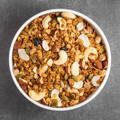Why do we need fibre?

What is dietary fibre?
Dietary fibre used to be referred to as 'bulk' or ‘roughage’, but we now know that it is so much more than that.
Broadly speaking, fibre refers to a group of substances in plant foods (such as fruit, vegetables and grains) that can't be broken down completely by the digestive enzymes in our bodies. These substances include waxes, lignin and polysaccharides (like cellulose and pectin).
Soluble and insoluble fibre
Fibre can come in the form of both carbohydrates and proteins, and it is often categorised according to its solubility into soluble or insoluble types. Both are found in different proportions in fibre-rich foods and have different effects. Insoluble fibre, for example, helps to increase the weight, bulk and softness of the stool, while soluble fibre dissolves in water to form a thick, gummy solution that can bind with toxins and other substances in the gut.
Is fibre digested?
It was originally thought that dietary fibre was completely indigestible and did not provide any energy, but it's now known that some fibre can be fermented in the large intestine by gut bacteria, producing short chain fatty acids and gases (methane, hydrogen and carbon dioxide).
The fatty acids are absorbed into the bloodstream and provide a small amount of energy. The amount of gas produced depends on the type of fibre eaten and the gut bacteria present.
After a large increase in the amount of fibre in the diet, some people can experience bloating, discomfort and wind. However, the large intestine and gut bacteria gradually adapt to the increased intake and symptoms usually disappear, provided that water intake is proportionally increased too and the digestive system is kept well hydrated.
How fibre supports health
While fibre largely passes through the body undigested as mentioned above, and therefore does not provide us with many nutrients, it can help the body in a number of other ways, such as:
- by increasing digestive transit time and therefore bowel regularity, helping to reduce any tendency towards constipation
- by decreasing the amount of time that food waste spends in the body, thereby helping to reduce the risk of infection or cell changes due to carcinogens that are produced when some foods (particularly meat) degrade
- by binding with cholesterol and triglycerides (potentially harmful fatty substances) in the gut, thereby helping to lower levels and inhibit their re-absorption
- by slowing the absorption of sugar into the bloodstream, thereby helping to lower the glycemic index of the food you have eaten (the food's effect on your blood glucose level)
- by slowing the absorption of fat eaten, helping to keep you feeling fuller for longer (certain types of fibre, such as psyllium husk and glucomannan, also swell in the digestive tract, increasing the satiety of a meal).
"While bran is excellent taken in its original form (as whole grains), extracted bran is highly irritant"

Are you getting enough fibre?
Most people know that a regular intake of dietary fibre is important for a healthy body and, in particular, an efficient digestive system. But fibre intake is actually incredibly varied across the world, both in terms of quality and quantity.
In rural Africa, for example, the average intake is about 55g of dietary fibre per day, while in the UK most people do not eat enough fibre. According to the British Nutrition Foundation, the average intake is 12.8g per day for women and 14.8g per day for men. The recommended average intake for adults is 18g per day, while at least 35g is ideal.
What's more, in the West (where our diets are dominated by animal products and refined and processed foods) we don't always eat quality dietary fibre. Often, what we think are good fibre foods are actually quite the opposite. For instance, many breakfast cereals market themselves to health-conscious consumers on the basis of containing "added fibre".
Unfortunately, packaged cereals will usually have lost some of their original fibre during the manufacturing process. Plus, added fibre is usually bran - the outer coating of the wheat grain removed to make white flour.
Essentially, these manufacturers have made a commercial decision to profit from what is a waste product at the expense of the consumer's health.
The trouble with bran
While bran is excellent taken in its original form (as whole grains), extracted bran is highly irritant.
It can upset people's systems, inflaming delicate membranes in the gut, producing bloating, excessive wind and anal discomfort. In the long term, where there is chronic inflammation, it can leave the way open to conditions such as leaky gut and even colitis.
Wheat bran also contains high levels of phytate, an anti-nutrient that reduces the absorption of essential minerals, including zinc.
It is therefore clear to see why it is so important to make smart choices about your dietary fibre sources. Naturally-occurring fibre, as part of whole foods (grains, nuts, seeds, legumes, fruits and vegetables) is your best option. Similarly, if you are looking to improve your digestive health, you may also want to reduce the amount of meat in your diet.
A frequent meat-eater with a low-fibre diet can increase the gut transit time of food from 24 to 72 hours, providing ample time for at least some putrefaction (rotting) to occur. Occasionally opting for plant-based protein sources will not only relieve some of the strain on your digestion, these foods also tend to be good sources of fibre and so you will naturally increase your intake.
Another important point to bear in mind is that much of the fibre in vegetables is destroyed by cooking, so they are best eaten raw and crunchy!
At InnerHealth we specialise in providing 100% Clean & Organic Herbs that are scientifically backed to provide optimal health for our customers - Why not try us today and ensure you are putting the very best nutrients into your mouth!


